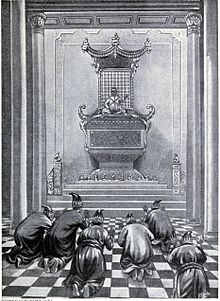Our website is made possible by displaying online advertisements to our visitors.
Please consider supporting us by disabling your ad blocker.
Bagyidaw
| Bagyidaw Sagaing Min ဘကြီးတော် | |||||
|---|---|---|---|---|---|
| King of Konbaung, Prince of Sagaing, Sagaing King, Royal Uncle | |||||
 A British depiction of Bagyidaw purportedly ordering to wrest Bengal from the British | |||||
| King of Burma | |||||
| Reign | 5 June 1819 – 15 April 1837 | ||||
| Coronation | 7 June 1819 | ||||
| Predecessor | Bodawpaya | ||||
| Successor | Tharrawaddy | ||||
| Born | Maung Sein (မောင်စိန်) 23 July 1784 Amarapura | ||||
| Died | 15 October 1846 (aged 62) Amarapura | ||||
| Burial | |||||
| Consort | Hsinbyume Nanmadaw Me Nu | ||||
| Issue | 5 sons, 5 daughters, including Setkya Mintha | ||||
| |||||
| House | Konbaung | ||||
| Father | Thado Minsaw | ||||
| Mother | Min Kye, Princess of Taungdwin | ||||
| Religion | Theravada Buddhism | ||||
Bagyidaw (Burmese: ဘကြီးတော်, pronounced [ba̰dʑídɔ̀]; also known as Sagaing Min, [zəɡáiɰ̃ mɪ́ɰ̃]; 23 July 1784 – 15 October 1846) was the seventh king of the Konbaung dynasty of Burma from 1819 until his abdication in 1837. Prince of Sagaing, as he was commonly known in his day, was selected as crown prince by his grandfather King Bodawpaya in 1808, and became king in 1819 after Bodawpaya's death. Bagyidaw moved the capital from Amarapura back to Ava in 1823.
Bagyidaw's reign saw the First Anglo-Burmese War (1824–1826), which marked the beginning of the decline of the Konbaung dynasty. He inherited the largest Burmese empire, second only to King Bayinnaung's, but also one that shared ill-defined borders with British India. In the years leading to the war, the king had been forced to suppress British supported rebellions in his grandfather's western acquisitions (Arakan, Manipur and Assam), but unable to stem cross border raids from British territories and protectorates.[1] His ill-advised decision to allow the Burmese army to pursue the rebels along the vaguely defined borders led to the war. The longest and most expensive war in British Indian history[2] ended decisively in British favor, and the Burmese had to accept British terms without discussion.[3] Bagyidaw was forced to cede all of his grandfather's western acquisitions, and Tenasserim to the British, and pay a large indemnity of one million pounds sterling, leaving the country crippled for years.
Devastated, Bagyidaw held out hope for some years that Tenasserim would be returned to him, and paid the balance of indemnity in 1832 at great sacrifice.[4] The British redrew the border with Manipur in 1830, but by 1833, it was clear the British would not return any of the former territories. The king became a recluse, and power devolved to his queen Nanmadaw Me Nu and her brother.[5] His brother Crown Prince Tharrawaddy raised a rebellion in February 1837, and Bagyidaw was forced to abdicate the throne in April 1837. King Tharrawaddy executed Queen Me Nu and her brother but placed his brother under house arrest. Bagyidaw died in October 1846 at age 62.[4]
Previous Page Next Page


